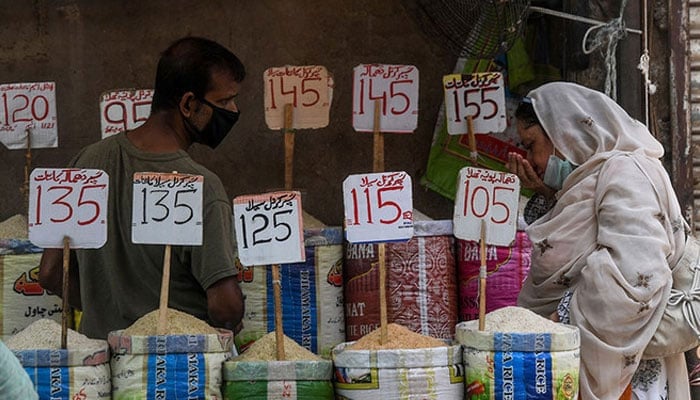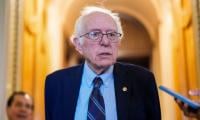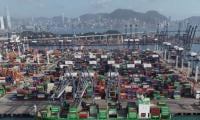Respite as inflation drops to 34-month low
Average CPI inflation for July-Aug 2024-25 was 10.36%, down from 27.8% in same period of previous fiscal year
ISLAMABAD: In a positive economic development, the headline inflation rate fell to a 34-month low of 9.6 percent in August 2024, marking the first time inflation has dropped to single digit since October 2021, the Pakistan Bureau of Statistics (PBS) reported on Monday.
This substantial decrease provides the much-needed respite for both consumers and policymakers, hinting at a possible stabilization after a period marked by economic turmoil, including soaring prices, currency devaluation, and fiscal challenges. However, the latter will be achieved if the State Bank significantly reduces the discount rate which is overdue, independent economists say.
The average CPI inflation for July-August 2024-25 was 10.36 percent, down from 27.8 percent in the same period of the previous fiscal year. The cooling of inflationary pressures is attributed to a combination of factors, including stabilizing commodity prices, improved supply chain management, and a relatively stabilized rupee against major currencies. However, the structural weaknesses of the economy and global economic conditions still pose substantial risks.
The Wholesale Price Index (WPI), indicating producers’ prices, arrived at 6.3pc in Aug 2024, marking the lowest reading since December 2020. In July 2024, it was at 10.4pc and 24.3pc in Aug 2023. The significant drop in WPI indicates that in coming months, the CPI inflation will further decline.
Similarly, the Sensitive Price Indicator (SPI), tracking essential item prices weekly, recorded at 10.8pc against 15.7pc in previous month and 27.9pc in Aug 2023. Economists and market analysts have welcomed the latest data, viewing the decline as a window of opportunity for the country’s decision-makers.
A lower inflation rate could pave the way for the central bank to cut interest rates, which currently stand at 19.5 percent. Such a move would lower the borrowing costs for businesses and households, potentially spurring economic activity.
More crucially, reduced interest rates could help the government manage its burgeoning budget deficit and ease the onerous burden of debt servicing, which has been a persistent drag on fiscal resources. Pakistan’s over three-fourth revenues are being eaten up by debt servicing.
Notably, the real interest rate, which is the current interest rate minus the inflation rate, stands at 9.9pc. It turned positive in March 2024 after a gap of 37 months. Since then, it has been rising in the positive territory, prompting the SBP to consider further cuts to the discount rate.
Maintaining a high positive real interest rate risks debt sustainability by increasing borrowing costs and straining public finances, especially in countries with significant debt burdens. Economists also attribute the lower figure of CPI to the base effect, which they say masks underlying inflationary pressures in the economy. The base effect occurs when the previous year’s inflation rate, or “base”, is high, distorting the current rate and making it appear lower than it might otherwise be.
Notably, the August inflation rate is significantly lower than the multi-decade high of 38pc recorded in May 2023. Last month in July 2024, it was at 11.09pc and 27.4pc in August 2023. As per the Pakistan Bureau of Statistics (PBS) monthly Consumer Price Index (CPI) bulletin, the drop in inflation in August 2024 was driven by a significant easing in prices for housing and utilities, which fell to 22.2pc from 25.3pc in July 2024.
Transportation saw a drop in cost to 3.17pc from 12.2pc, clothing & footwear to 17.3pc from 18.2pc, and price also slowed for restaurants and hotels, dropping to 10pc from 11.2pc in previous month. Similarly, education charges reduced to 12.8pc from 15.94pc, recreation & culture to 7.77 pc from 10.24pc, and healthcare expense to 17.8pc from 19.13pc.
However, food and non-alcoholic beverages inflation saw a rise to 2.5pc from 1.6pc in previous month. As per the PBS, on a month-on-month basis, CPI increased to 0.4pc in Aug 2024, compared to an increase of 2.1pc in July and an increase of 1.7pc in Aug 2023.
Furthermore, core inflation, which excludes food and energy costs, moderated to 10.2pc in Aug 2024 from 11.7pc in previous month and 18.4pc in Aug 2023. The August reading of core inflation is 28-month low.
In urban areas, inflation fell to 11.7pc from the previous month’s 13.2pc and the corresponding month last year’s 25pc. Rural inflation was down to 6.7pc from 8.1pc in previous month and 30.9pc in Aug 2023.
Meanwhile, in a related development, Prime Minister Shehbaz Sharif expressed satisfaction over the decrease of inflation rate to single digit and said the country could not develop without making life easier for the common man and ensuring the economic well-being.
A statement issued by the Prime Minister Media Wing quoted Shehbaz as saying the Pakistan Bureau of Statistics’ announcement with regard to the decline in inflation reflected the government’s measures to improve the economy.
He attributed the lowest inflation rate in the past three years to the hard work of the economic team. He said the economic experts predictions about further drop in inflation during the current month was seen as good news for the nation.
The prime minister said the PMLN government in 2018 had left behind single digit inflation rate; however, due to the criminal negligence and anti-people policies over the next four years, the economy suffered, inflation surged to record level, and the public endured a period of hardship.
He said the positive results of the government’s economic reforms were now reaching out to the people in the form of increased prosperity.
Meanwhile, Minister for Information Attaullah Tarar informed the National Assembly on Monday that the recent decline in inflation to single digit was an evidence of prudent economic policies of the federal government under the leadership of Prime Minister Shehbaz Sharif.
Responding to a question during the question hour, he said for the first time in the last three years inflation recorded at 9.6 percent as per reports of the State Bank of Pakistan. Tarar said inflation was mere 4 percent during the tenure of PMLN government in 2018 which then surged to 22 percent.
He said the Punjab government had given subsidy to the electricity consumers of entire province, including Islamabad, from its development budget. Similarly, the federal government has already given Rs50 billion subsidy to the consumers utilizing up to 200 units, he added.
Tarar said it would be better if other provinces could also give subsidy to the electricity consumers. It would also be good if those who took money from the timber and tobacco mafias, also facilitate the consumers of their province, he added.
-
 ‘Miracle On Ice’ Redux? US Men Chase First Olympic Hockey Gold In 46 Years Against Canada
‘Miracle On Ice’ Redux? US Men Chase First Olympic Hockey Gold In 46 Years Against Canada -
 Friedrich Merz Heads To China For High Stakes Talks In An Effort To Reset Strained Trade Relations
Friedrich Merz Heads To China For High Stakes Talks In An Effort To Reset Strained Trade Relations -
 Astronauts Face Life Threatening Risk On Boeing Starliner, NASA Says
Astronauts Face Life Threatening Risk On Boeing Starliner, NASA Says -
 Hailey Bieber Reveals How Having Ovarian Cysts Is 'never Fun'
Hailey Bieber Reveals How Having Ovarian Cysts Is 'never Fun' -
 Kayla Nicole Looks Back On Travis Kelce Split, Calls It ‘right Person, Wrong Time’
Kayla Nicole Looks Back On Travis Kelce Split, Calls It ‘right Person, Wrong Time’ -
 Prince William And Kate Middleton Extend Support Message After Curling Team Reaches Olympic Gold Final
Prince William And Kate Middleton Extend Support Message After Curling Team Reaches Olympic Gold Final -
 Nvidia CEO Praises Elon Musk, Calls Him An ‘extraordinary Engineer'
Nvidia CEO Praises Elon Musk, Calls Him An ‘extraordinary Engineer' -
 Shia LaBeouf's Mugshot Released After Mardi Gras Arrest On Battery Allegations In New Orleans
Shia LaBeouf's Mugshot Released After Mardi Gras Arrest On Battery Allegations In New Orleans -
 Timothee Chalamet Felt '17 Again' After Reunion With 'Interstellar' Director Christopher Nolan
Timothee Chalamet Felt '17 Again' After Reunion With 'Interstellar' Director Christopher Nolan -
 Conan O'Brien Speaks First Time After Rob Reiner's Killing
Conan O'Brien Speaks First Time After Rob Reiner's Killing -
 Giant Tortoise Reintroduced To Island After Almost 200 Years
Giant Tortoise Reintroduced To Island After Almost 200 Years -
 Eric Dane Drops Raw Confession For Rebecca Gayheart In Final Interview
Eric Dane Drops Raw Confession For Rebecca Gayheart In Final Interview -
 Trump Announces New 10% Global Tariff After Supreme Court Setback
Trump Announces New 10% Global Tariff After Supreme Court Setback -
 Influencer Dies Days After Plastic Surgery: Are Cosmetic Procedures Really Safe?
Influencer Dies Days After Plastic Surgery: Are Cosmetic Procedures Really Safe? -
 Eric Dane Confesses Heartbreaking Regret About Daughters' Weddings Before Death
Eric Dane Confesses Heartbreaking Regret About Daughters' Weddings Before Death -
 Nicole 'Snooki' Polizzi Reveals Stage 1 Cervical Cancer Diagnosis
Nicole 'Snooki' Polizzi Reveals Stage 1 Cervical Cancer Diagnosis




